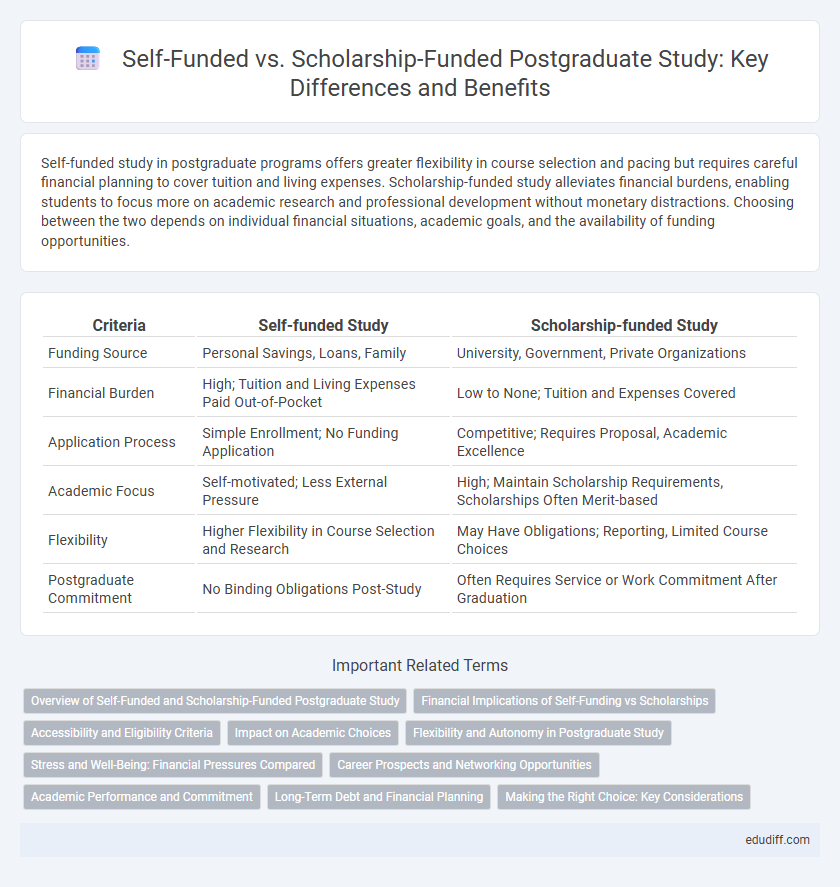Self-funded study in postgraduate programs offers greater flexibility in course selection and pacing but requires careful financial planning to cover tuition and living expenses. Scholarship-funded study alleviates financial burdens, enabling students to focus more on academic research and professional development without monetary distractions. Choosing between the two depends on individual financial situations, academic goals, and the availability of funding opportunities.
Table of Comparison
| Criteria | Self-funded Study | Scholarship-funded Study |
|---|---|---|
| Funding Source | Personal Savings, Loans, Family | University, Government, Private Organizations |
| Financial Burden | High; Tuition and Living Expenses Paid Out-of-Pocket | Low to None; Tuition and Expenses Covered |
| Application Process | Simple Enrollment; No Funding Application | Competitive; Requires Proposal, Academic Excellence |
| Academic Focus | Self-motivated; Less External Pressure | High; Maintain Scholarship Requirements, Scholarships Often Merit-based |
| Flexibility | Higher Flexibility in Course Selection and Research | May Have Obligations; Reporting, Limited Course Choices |
| Postgraduate Commitment | No Binding Obligations Post-Study | Often Requires Service or Work Commitment After Graduation |
Overview of Self-Funded and Scholarship-Funded Postgraduate Study
Self-funded postgraduate study involves financing tuition and living expenses independently, often through personal savings, loans, or part-time work, providing greater autonomy in course selection and scheduling. Scholarship-funded postgraduate study offers financial support based on academic merit, research potential, or specific criteria, reducing financial burden and enabling full commitment to studies and research activities. Both pathways impact access to resources, networking opportunities, and career prospects differently, influencing the overall postgraduate experience and outcomes.
Financial Implications of Self-Funding vs Scholarships
Self-funded postgraduate study demands direct payment of tuition fees and living expenses, potentially leading to significant personal debt or depletion of savings. Scholarship-funded study alleviates financial burdens by covering tuition fees, providing stipends for living costs, and sometimes offering resources for research, reducing financial stress and allowing full academic focus. Evaluating total costs, opportunity costs, and long-term financial impact is crucial in deciding between self-funding and securing scholarships for postgraduate education.
Accessibility and Eligibility Criteria
Self-funded postgraduate study offers unrestricted accessibility, allowing students from diverse academic and financial backgrounds to enroll without stringent eligibility constraints. Scholarship-funded study provides financial relief but often includes competitive eligibility criteria such as academic excellence, research potential, or specific demographic requirements. Accessibility in scholarship-funded programs is limited by these criteria, making them less universally attainable compared to self-funded options.
Impact on Academic Choices
Self-funded postgraduate students often prioritize programs with flexible schedules and shorter durations to manage financial constraints, influencing their academic choices toward practical and career-oriented fields. Scholarship-funded students typically have broader access to specialized research opportunities and prestigious institutions, enabling deeper academic exploration and advanced study areas. Financial support type significantly shapes enrollment decisions, research scope, and long-term academic goals in postgraduate education.
Flexibility and Autonomy in Postgraduate Study
Self-funded postgraduate study offers greater flexibility and autonomy, allowing students to choose courses, research topics, and timelines without external constraints tied to scholarship conditions. Scholarship-funded study often requires adherence to specific academic goals, progress benchmarks, and institutional obligations, limiting students' ability to modify their study plans freely. This autonomy in self-funded study supports personalized academic and professional development tailored to individual career objectives.
Stress and Well-Being: Financial Pressures Compared
Self-funded postgraduate students often experience heightened stress levels due to managing tuition fees, living expenses, and potential debt accumulation, directly impacting their mental well-being. Scholarship-funded students generally report lower financial stress, allowing greater focus on academic performance and personal growth. Research indicates that reduced economic pressure correlates with improved psychological health and academic success among scholarship recipients.
Career Prospects and Networking Opportunities
Self-funded postgraduate study often allows greater flexibility in choosing specific programs aligned with career goals, potentially enhancing personalized skill development and employability. Scholarship-funded study typically provides access to exclusive networking opportunities through alumni events, industry partnerships, and academic conferences, which can significantly boost professional connections. Both pathways influence career prospects, but scholarship-funded students generally benefit from stronger institutional support and visibility among prospective employers.
Academic Performance and Commitment
Self-funded postgraduate students often demonstrate heightened academic performance and strong commitment due to personal investment and the pressure to justify their financial resources. Scholarship-funded students benefit from reduced financial stress, allowing them to focus intensively on research and coursework, often resulting in higher academic productivity. Commitment levels in scholarship-funded studies are typically driven by scholarship conditions and performance expectations tied to funding continuation.
Long-Term Debt and Financial Planning
Self-funded postgraduate study often leads to long-term debt, requiring meticulous financial planning to manage loan repayments and living expenses. Scholarship-funded study eliminates or significantly reduces this financial burden, enabling students to focus on academic and career goals without the stress of accumulating debt. Effective financial planning for self-funded students includes budgeting, seeking part-time work, and exploring loan forgiveness programs to mitigate long-term financial impacts.
Making the Right Choice: Key Considerations
Choosing between self-funded and scholarship-funded postgraduate study requires evaluating financial stability, academic goals, and long-term career benefits. Self-funded students maintain full control over their educational decisions but bear the entire cost, whereas scholarship recipients gain financial relief and prestige, often tied to specific academic achievements or commitments. Prospective postgraduate students should assess eligibility criteria, potential debt impact, and personal motivation to make an informed decision aligning with both their professional aspirations and financial capacity.
Self-funded Study vs Scholarship-funded Study Infographic

 edudiff.com
edudiff.com